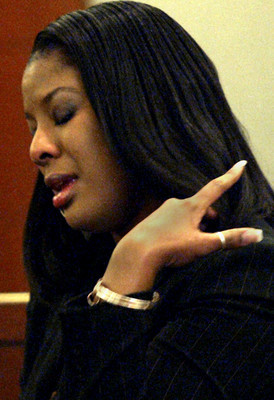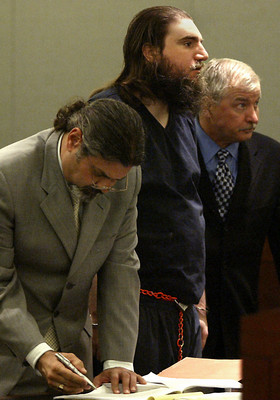Man sentenced in Strip deaths
In his last hour, Gordon Kusayanagi was walking on the Strip singing Elton John's "Your Song," accompanied by music from the Bellagio fountains.
"For the last hour of his life, this was his song," his wife, Stephanie, wrote in a letter to the court that was read Friday by her son.
Moments after that happy moment on the Strip in September 2005, Stephen Ressa, 29, drove his Buick sedan onto the sidewalk near Bally's, hunting down passers-by and mowing them down with his vehicle.
And Kusayanagi's husband, a 52-year-old musician, businessman, father and grandfather from Hollister, Calif., was ripped from her life.
Ressa, who defense attorneys said has been diagnosed with paranoid schizophrenia, told police at the scene that he thought the tourists were "demons" trying to kill him.
"He acted to save his life," Ressa's defense attorney Joseph Abood said about the Sept. 21, 2005, crash that killed three tourists and injured about a dozen others.
Stephanie Kusayanagi, who was on vacation in Las Vegas with her husband at the time, concluded her letter, quoting her husband's last song, "I hope you don't mind, that I put down in words, how wonderful life is while you're in the world," bringing many in the courtroom to tears.
Family and friends of the victims spoke Friday in District Judge Michelle Leavitt's courtroom, where Ressa was sentenced to three life sentences without the possibility of parole for the death of Kusayanagi, Mark Modaressi, 26, of Irvine, Calif., and Richard Bradford, 60, of Renton, Wash.
Those charges will run consecutive to his sentence of 52 to 520 years for 13 charges of attempted murder with use of a deadly weapon and his sentence of two to 16 years for possession of a stolen vehicle and battery by a prisoner.
The sentence was previously agreed upon by attorneys after Ressa pleaded guilty but mentally ill in October to the 18 counts in exchange for prosecutors dropping the death penalty.
"I wanted him to live so he could think about what he did every day. Death wouldn't have been good" enough for Ressa, said Jenice Spriddell, a relative of Bradford's.
Like other family members who packed the courtroom, she was there to wrap up the two-year criminal case against Ressa with the memories of those he killed.
"I needed this closure," said Bradford's daughter, Jasmine Bradford.
The Kusayanagis' friends and family represented the majority of those in the courtroom.
Gordon Kusayanagi played guitar in his son's cover band "10 til 2." Fans called him "El Machino" because of his continually perfect performances on stage, his son, Scott Kusayanagi, testified.
The 31-year-old called his father the afternoon of the incident to talk with him about San Francisco Giants slugger Barry Bond's performance that day, and later received a call from his mother that his dad was in the hospital.
Scott Kusayanagi flew to Las Vegas. As he opened his mother's hotel room door, she told him: "He's gone."
He plans today to play his dream gig at the Shoreline Amphitheater in Mountain View, Calif. "With 16,000 seats in front of me, I will take comfort in knowing my band mate, my father, but most importantly my best friend will be watching over me," he said.
Leavitt found that Ressa was mentally ill at the time of the crash and sentencing, and ordered the Department of Corrections to continue treating him for paranoid schizophrenia.
Abood read a letter to the court from Ressa's parents who expressed remorse for the victims' families and frustration with the mental health system that had misdiagnosed their son.
They said Ressa entered a mental health facility in August 2005 for a second time, in California, where he was treated again for a bipolar disorder and released to his parents after he disrupted a group outing.
The next day he beat his mother unconscious, stole her Buick and drove to Las Vegas.
The deadly crash could have been prevented if he hadn't been misdiagnosed, the parents said.
"We did our best, based on what we knew to help him," they wrote.
Contact reporter K.C. Howard at khoward@reviewjournal.com or (702) 380-1039.



















